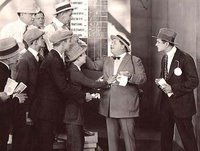
given my pop culture avocations, people can't understand why i've never plugged into
the cable. just when i think i really
need cnn or comedy central, however, i flip channels in a hotel room and see something too horrible for words. such is the case with [
warning: the following link is brutal]
ultimate fighting.
i raise the issue because i spoke this weekend with an intelligent young woman who attended a pay-per-view
UFC event with her boyfriend. when i asked what she liked about it, she pointed to "passion" and the faces of the participants. dang. they'd get as much passion and intensity watching a good
guitar face at the local bar.
but she's not alone, and that's got me worried. ultimate fighting is
outdrawing the baseball playoffs among males age 18-34. is
this the state of american masculinity in 2006? i'll summarize a
spike tv bout i saw while traveling this summer: palooka A knocks palooka B into chain-link fence, straddles B's chest, and pounds face until some savagery threshold is crossed (unconsciousness? a two-quart blood rule?), whereupon A is declared the victor. i've seen more civilized fights in prison yards.
after one has physically dominated an opponent, doesn't
man law dictate mercy? or is mercy the crucial distinction between
ultimate fighting and plain vanilla
penultimate fighting? somewhere along the line i picked up the idea that a man doesn't continue hitting or kicking a
fallen opponent into unconsciousness, or immobilize him and
then cave in his face with elbow shots.
i admit that i'm the wrong guy to cluck about this, given my own conflicted history with violence. among my edumacated friends, i'm a lonely
defender of disciplined and attenuated violent forms such as football, rugby, and wrestling -- and i continue to applaud my
significantly larger lad's participation in such activities. if anything, he's learned discipline and control in these sports. to my knowledge, at least, he has yet to throw a punch in anger.
i lost my stomach for boxing after
boom-boom mancini v. duk-koo kim, but i'll admit that i've probably
participated in more violence than most sociologists or criminologists. on the other hand, with the possible exception of
murray straus, i also
watch far less of it than any sociologist or criminologist i know. i've simply got no time for the phony played-out bloodfests by scorcese and tarantino. i'll grant you that
straw dogs,
mean streets, and
clockwork may have had something important to say. but thirty years later i'm amazed that critics, most of whom have neither thrown nor taken a punch,
still lap up the same old tired movie tropes as
authentic.i work hard as a criminologist because i want a little more justice and a whole lot less violence in the world. for me, real violence is only interesting in the way that hiv/aids and earthquakes are interesting. but that's a rant for another day. ultimate fighting strikes me as straight-up pornography, perhaps a step or two below cockfighting on the debasement scale. as long as i've got kids in the house and comcast is pushing UFC (and, frankly, i could throw
goodfellas and
reservoir dogs in there as well), they'll just have to make do without me. i see an ugly human transaction whenever two human beings come to blows, made all the uglier by money and spectators.
 my friday talk was co-sponsored by a law school and a soc department. over the years, i've spoken in econ departments and crim departments and law schools and african american studies departments. it is always fun to see the different norms regarding length, interruptions, and so forth. in the soc series, the speakers are expected to talk for an hour and then take questions for thirty minutes. in the law series, in contrast, they are expected to speak for seven minutes before engaging in questions. this must have something to do with billable hours.
my friday talk was co-sponsored by a law school and a soc department. over the years, i've spoken in econ departments and crim departments and law schools and african american studies departments. it is always fun to see the different norms regarding length, interruptions, and so forth. in the soc series, the speakers are expected to talk for an hour and then take questions for thirty minutes. in the law series, in contrast, they are expected to speak for seven minutes before engaging in questions. this must have something to do with billable hours.









